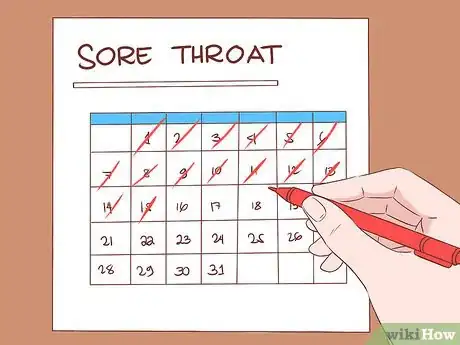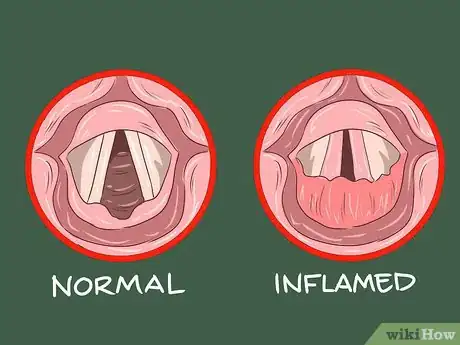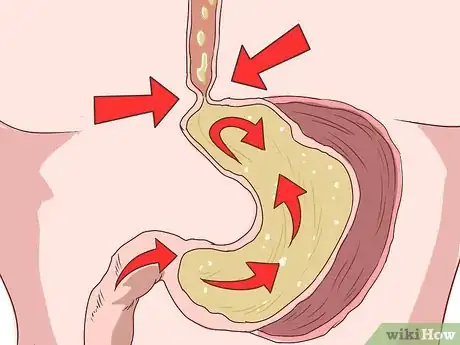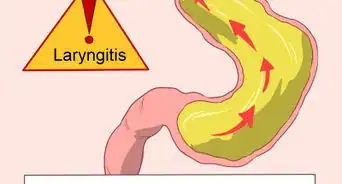This article was medically reviewed by Mark Ziats, MD, PhD. Dr. Mark Ziats is an Internal Medicine Physician, Scientist, Entrepreneur, and the Medical Director of xBiotech. With over five years of experience, he specializes in biotechnology, genomics, and medical devices. He earned a Doctor of Medicine degree from Baylor College of Medicine, a Ph.D. in Genetics from the University of Cambridge, and a BS in Biochemistry and Chemistry from Clemson University. He also completed the INNoVATE Program in Biotechnology Entrepreneurship at The Johns Hopkins University - Carey Business School. Dr. Ziats is board certified by the American Board of Internal Medicine.
There are 14 references cited in this article, which can be found at the bottom of the page.
This article has been viewed 49,456 times.
Laryngitis is when your voice box (or larynx) is inflamed.[1] In laryngitis, the voice box is irritated, and your voice may become hoarse or even disappear.[2] In many cases, laryngitis is a minor, temporary condition caused by a recent cold or illness. However, laryngitis may also be a chronic condition that is a sign of more serious medical conditions.[3] Know the risk factors and symptoms of laryngitis to determine whether your larynx may be inflamed.
Steps
Signs and Symptoms
-
1Pay attention to the quality of your voice. Having a voice that is hoarse (scratchy) or weak is the first sign that you have laryngitis. Your voice becomes rough, hoarse or gravelly-sounding, or sometimes too soft or quiet. In acute laryngitis there is a swelling of vocal cords that impairs the normal vibration. Ask yourself:
- Do you notice any scratching or vocal fry when you speak?
- Does your voice sound more gravelly than usual?
- Does your voice give out or soften when you don't want it to?
- Has your voice changed pitch? Is it higher or lower than usual?[4]
- Is it hard to raise your voice above a whisper?
- Be aware that a change in your voice may also occur after a stroke, when the vocal cords are paralyzed. You may find that you're unable to speak at all. However, there will be other symptoms such as deviation of angle of mouth, weakness of limbs, drooling, and difficulty in swallowing, etc.
-
2Take note of a dry cough. Irritation of the vocal cords will provoke the desire to cough. However, a cough caused by laryngitis will be dry instead of wet.[5] This is because a laryngitis cough is restricted to the upper airway but not the lower airway where sputum is produced.
- If your cough is wet and produces sputum, you most likely do not have a case of laryngitis. You might have a cold or other virus. However, these viruses have the potential to turn into laryngitis after a while.
Advertisement -
3Notice a throat that is dry, sore, or full-feeling. Laryngitis can also cause painful or uncomfortable symptoms in the throat. You may feel a fullness or rawness in your throat because of the swelling of the walls of the nasopharynx (the junction between your airway and the food passage) or throat. Ask yourself:
- Does my throat hurt when I swallow or eat?
- Do I feel the urge to clear my throat constantly?
- Does my throat feel tickly or scratchy?
- Does my throat feel dry or raw?[6]
-
4Take your temperature. Some cases of laryngitis are caused by an infection. In this case, you might also experience a low or moderate-grade fever. Take your temperature to see if you are running a fever. If so, then you might be experiencing a viral laryngitis. Your fever will likely resolve itself in a few days, though your throat symptoms will likely last longer than that
- If the fever persists or gets worse you should seek medical attention promptly because it may be a sign of pneumonia. You should also contact a doctor immediately if your temperature hits 103 degrees Fahrenheit or higher.[7]
-
5Consider whether you have recently experienced cold or flu symptoms. Laryngitis symptoms often last for several days or weeks after you have recovered from a cold, flu, or other virus. If you have current throat symptoms and also had viral symptoms within the last two weeks, that is a signal that you have laryngitis. Such symptoms include:
- A runny nose
- Headache
- Fever
- Fatigue
- Body aches and pains
-
6Notice any breathing difficulty. Breathing difficulty can occur during laryngitis, especially in young children.[8] If you or your child is short of breath, cannot breathe normally while lying down, or makes a high-pitched sound while breathing in (stridor), this is a sign of laryngitis. This is also an emergency situation that will require immediate medical attention. Call your doctor immediately.
-
7Feel your throat for lumps. Chronic laryngitis can sometimes be accompanied by the development of lumps, polyps, or nodules in or near your vocal cords. If you feel as if there is a lump blocking your throat, that is a sign that you have laryngitis and should see a doctor right away. In many cases, this feeling of having a lump in your throat is due to chronic laryngitis caused by acid reflux disease.
- The sensation may provoke a desire to clear the throat. If you do have this urge, try to resist it: clearing your throat aggravates the condition.
-
8Consider how well you are swallowing. The more severe cases of laryngitis can cause a difficulty in swallowing. Other, more serious medical conditions associated with laryngitis might also lead to difficulty swallowing. For example, if there is a large tumor or lump inside the larynx, it may compress the food tube (esophagus) and lead to difficulty in swallowing. This is a symptom that requires immediate medical attention.
- In laryngitis due to gastroesophageal reflux disease, there will be chronic irritation of the esophagus by stomach acid. Consequently, there may be ulcers in the esophagus that lead to swallowing difficulty.[9]
-
9Mark how long you are feeling hoarse on a calendar. Many people experience hoarseness every now and again. However, if the laryngitis is a chronic condition, it will last for more than two weeks. Take note of how long you are feeling hoarse on a calendar. Share with your doctor how long your symptoms persist. This will allow your doctor to determine whether your laryngitis is acute or chronic.[10]
- Voice hoarseness is characterized by a low, raspy voice which tires easily.
- There are other causes of chronic hoarseness besides laryngitis. A tumor in the chest or neck may compress the nerves leading to hoarseness. Other symptoms of a tumor include long term cough, bloody sputum, weight loss, appetite loss, swelling of the face and arms, etc. Consult a doctor immediately if you experience these symptoms alongside your laryngitis.[11]
Acute Laryngitis
-
1Know what acute laryngitis is. This is the most common type of laryngitis. It is sudden in onset and reaches its peak severity within one to two days. The condition usually starts to subside after a few days, and you will feel much better at the end of the week. Most people experience acute laryngitis at some point in their lives.
-
2Recognize that a viral infection is the most common cause. Usually laryngitis is preceded by a respiratory infection such as the common cold, flu, or sinusitis.[12] Acute laryngitis can continue for many days after the other symptoms of the infection subside.
- You may infect other people by spreading droplets with coughing or sneezing. Practice proper hygiene to avoid infecting others.
-
3Be aware that bacterial infections may cause acute laryngitis. While rarer than viral causes, certain bacterial infections may also cause laryngitis. These include bacterial pneumonia, bronchitis, or diphtheria. In this case, you might require antibiotics in order to shake your laryngitis.
-
4Consider whether you have recently overused your voice. Another cause of acute laryngitis is the sudden overuse of your vocal cords. Shouting, singing, or speaking at length may cause fatigue and swelling of the vocal cords. Those who use their voices often for work or in their hobbies might be at risk of developing chronic laryngitis from voice overuse. However, sometimes voice overuse can lead to temporary laryngitis as well. Some common causes of acute laryngitis from voice overuse include:
- Yelling to be heard at a bar
- Cheering at a sporting event
- Singing loudly without proper training
- Talking or singing loudly in a location filled with smoke or other irritants
Chronic Laryngitis
-
1Know what chronic laryngitis is. If the inflammation persists more than two-three weeks, then it is called chronic laryngitis. Usually the voice change develops gradually over a period of few weeks. The condition often gets worse with prolonged use of the voice box. In some cases, chronic laryngitis is an indicator of more serious medical conditions.
-
2Recognize that airborne irritants can lead to chronic laryngitis. Long term inhalation of irritant substances like chemical fumes, smoke, and allergens are all reported causes of chronic laryngitis.[13] Smokers, firefighters, and those who work with chemicals are at particular risk for chronic laryngitis.
- You should also avoid exposure to allergens. When your body experiences an allergic reaction, all the tissues will suffer inflammation, including the larynx. If you know you are allergic to a substance, try to avoid having that substance in your home to ensure that you do not experience chronic laryngitis.
-
3Be aware that gastroesophageal reflux disease (GERD) can cause laryngitis. The most common cause of chronic laryngitis is GERD or acid reflux disease.[14] GERD patients experience a backflow of stomach acids into the esophagus and mouth. As a GERD patient breathes, the liquid content may be aspirated inadvertently, which irritates the larynx. Chronic irritation causes swelling of the vocal cords that may change your voice.[15]
- GERD is a condition that is treatable with dietary changes and medication. Consult your doctor if you have chronic laryngitis caused by acid reflux disease.
-
4Watch your alcohol consumption. Consuming alcohol relaxes the muscles in your larynx, making your voice hoarse. Prolonged alcohol intake can irritate the mucous membrane of the larynx, causing laryngitis.
- Alcohol overconsumption might also exacerbate acid reflux disease and is a risk factor for certain throat cancers. These conditions might also lead to chronic laryngitis.
-
5Recognize that voice overuse can lead to chronic laryngitis. Those who are singers, teachers, bartenders, or public speakers are at particular risk of developing chronic laryngitis.[16] Overusing your voice can cause fatigue and thickening of vocal cords. Misusing your voice might also lead to the development of a polyp (or an unusual growth of tissue) on a mucous membrane. When polyps develop on the vocal cords, they can irritate the voice box, causing laryngitis.
- If you are in a profession that is at a high risk of chronic laryngitis, consider taking special speech therapy or voice lessons to train yourself to speak in a way that is easy on your vocal cords. It is also wise for you to rest your voice on days when it is not absolutely necessary for you to talk, yell, or sing.[17]
Diagnosis and Treatment
-
1Make an appointment with a physician. If your laryngitis symptoms persist, or if you experience any particularly worrying symptoms such as having difficulty breathing or swallowing, you should call your doctor right away. Depending on the severity of your condition, you might see your regular physician or you might be referred to an ear, nose, and throat specialist.[18]
-
2Provide a full medical history. The first step in a diagnosis will be to take your full medical history. Your doctor will likely ask about the demands of your profession, allergies, medications, other symptoms you experience, and about any recent infections you have had. This is the first step in determining whether or not you have laryngitis and whether your case is acute or chronic.
- Your doctor will likely ask about symptoms of common medical ailments that lead to chronic laryngitis, such as acid reflux, alcohol use, and chronic allergies.
-
3Say "aaaaaah." Your doctor will have to examine your throat and vocal cords visually, with the aid of a mirror. By opening your mouth and saying "aaaaaah," your doctor will have a better view of these organs. Your doctor will be on the lookout for abnormal bumps, lesions, polyps, swelling, and colors that can help lead her to a diagnosis.
- If your doctor suspects a bacterial cause for your laryngitis, you might also have to provide a throat culture. Your doctor will lightly swab the back of your throat and send it to the lab for testing. This leads to an unpleasant, but very brief, sensation in the throat.
-
4Submit to more invasive tests. Most likely your laryngitis is acute and will not require any further testing. However, if your doctor is concerned about the possibility of chronic laryngitis, cancer, or other serious conditions, you might have to undergo more serious tests to determine the severity of your condition.[19] These include:
- A laryngoscopy. In this procedure, your doctor will use a light and mirror to examine how your vocal cords move. Your doctor may also insert a small, thin cable with a camera into your nose or mouth to get a better visual of your vocal cords while you speak.
- A biopsy. If your doctor suspects that you have precancerous or cancerous cells, she might perform a biopsy of your vocal cords. She will remove a sample of cells from the suspicious area and examine them under a microscope to determine whether they are healthy or unhealthy cells.
- A chest X-ray. This is most commonly done for children who have severe laryngitis symptoms. A chest X-ray can help determine whether there is any concerning swelling or blockages.
-
5Follow your doctor's treatment recommendations. Depending on the cause and severity of your laryngitis, your doctor may have different recommendations for how to treat your condition. In many cases, your doctor will recommend the following:
- Rest your voice. Avoid loud talking or singing until your laryngitis has resolved.[20]
- Do not whisper. Whispering is harsher on your vocal cords than regular talking. Speak softly, but resist the urge to whisper.[21]
- Do not clear your throat. Even when your throat feels dry, full, or scratchy, resist the urge to clear it. That just puts more pressure on your vocal cords.[22]
- Stay hydrated. Keep yourself well hydrated by drinking plenty of water and herbal tea. This will also help lubricate and soothe your sore throat.[23]
- Use a humidifier or vaporizer. Inject moisture into the air in order to ease your symptoms and help your vocal cords to repair themselves. Using a humidifier or vaporizer overnight while you sleep is an excellent step to take. You can also take frequent hot showers in order to breathe in the steam.[24]
- Avoid alcohol. Alcohol is acidic and puts unneeded pressure on vocal cords. Stay away from alcoholic beverages while you are experiencing laryngitis. Reducing your alcohol intake can also help prevent future bouts of laryngitis.
- Avoid decongestants. Decongestants can help when you have a wet cough caused by a cold. However, they exacerbate the dry cough characteristic of laryngitis. Never take a decongestant if you suspect you have laryngitis.[25]
- Quit smoking. Smoking is one of the leading causes of chronic laryngitis, and it can lead to much more serious conditions such as throat cancer. Quit smoking as soon as you can in order to prevent vocal cord damage.
- Soothe your throat. Herbal teas, honey, salt water gargles, and throat lozenges are all excellent ways to soothe a throat that is sore due to laryngitis.
- Seek acid reflux treatment. If your laryngitis is caused by acid reflux, your doctor will likely provide dietary recommendations and medications to ease your symptoms. For example, you should eat smaller meals, avoid eating before bedtime, and avoid acidic foods and beverages such as alcohol, chocolate, tomatoes or coffee.
- Take voice lessons. If you need your voice for your profession, you may be able to take lessons in order to learn how to use your voice properly. Many singers, for example, require lessons in order to learn how to project their voices without putting undue strain on their vocal cords.
- Take prescription medication. If your laryngitis is caused by bacteria, you might require antibiotics. If your vocal cords are severely swollen in a way that impacts your ability to eat or breathe, you might require steroids to reduce the inflammation.[26]
Warnings
- Some of the symptoms of laryngitis can be caused by serious medical conditions including cancer, tumor, or stroke. Pay attention to your body and talk to your doctor if you think your laryngitis may be something more serious.⧼thumbs_response⧽
- Talk to a doctor immediately if you experience trouble swallowing, trouble breathing, persistent symptoms that do not improve after a week or two, or bloody sputum. These are signs of serious conditions that will likely not clear up on their own.⧼thumbs_response⧽
References
- ↑ http://www.mountsinai.org/patient-care/health-library/diseases-and-conditions/laryngitis
- ↑ http://www.cham.org/health-library/article?id=ue5046
- ↑ http://www.cham.org/health-library/article?id=ue5046
- ↑ http://www.mountsinai.org/patient-care/health-library/diseases-and-conditions/laryngitis
- ↑ https://www.healthdirect.gov.au/laryngitis#symptoms
- ↑ https://www.healthdirect.gov.au/laryngitis#symptoms
- ↑ http://www.mayoclinic.org/diseases-conditions/laryngitis/basics/symptoms/con-20021565
- ↑ https://www.nhs.uk/conditions/laryngitis/
- ↑ http://www.mayoclinic.org/diseases-conditions/laryngitis/basics/symptoms/con-20021565
- ↑ https://www.nhs.uk/conditions/laryngitis/
- ↑ http://www.mayoclinic.org/diseases-conditions/laryngitis/basics/symptoms/con-20021565
- ↑ https://patient.info/ears-nose-throat-mouth/laryngitis-leaflet#nav-1
- ↑ https://www.hopkinsmedicine.org/health/conditions-and-diseases/laryngitis
- ↑ http://www.webmd.com/cold-and-flu/tc/laryngitis-topic-overview
- ↑ http://www.nejm.org/doi/full/10.1056/NEJMcp0804684
- ↑ https://www.hopkinsmedicine.org/health/conditions-and-diseases/laryngitis
- ↑ http://www.mayoclinic.org/diseases-conditions/laryngitis/basics/lifestyle-home-remedies/con-20021565
- ↑ https://www.healthdirect.gov.au/laryngitis#symptoms
- ↑ http://www.mayoclinic.org/diseases-conditions/laryngitis/basics/tests-diagnosis/con-20021565
- ↑ http://www.mayoclinic.org/diseases-conditions/laryngitis/basics/lifestyle-home-remedies/con-20021565
- ↑ http://www.cham.org/health-library/article?id=ue5046
- ↑ http://www.mayoclinic.org/diseases-conditions/laryngitis/basics/lifestyle-home-remedies/con-20021565
- ↑ http://www.webmd.com/cold-and-flu/tc/laryngitis-topic-overview?page=2
- ↑ http://www.webmd.com/cold-and-flu/tc/laryngitis-topic-overview?page=2
- ↑ http://www.mayoclinic.org/diseases-conditions/laryngitis/basics/lifestyle-home-remedies/con-20021565
- ↑ http://www.mayoclinic.org/diseases-conditions/laryngitis/basics/treatment/con-20021565
About This Article
If you're worried that you have laryngitis, monitor yourself for any hoarseness or weakness in your voice because laryngitis will swell your vocal cords and affect their vibration. In addition to changes to your voice, look out for a dry cough and a sore rawness in your throat. Some cases of laryngitis are caused by an infection, so you should take your temperature to see if you have a low or moderate-grade fever. Check your throat for lumps as well, since acid reflux from chronic laryngitis can cause lumps or nodules in or near your vocal cords. You might have some difficulty breathing, but if you make a high-pitched sound while breathing in, then you should call your doctor immediately for emergency medical attention. Even if you aren’t wheezing, see a doctor if you think you have laryngitis for a proper diagnosis. For advice from our Medical co-author, including how to recognize risk factors for chronic laryngitis, scroll down.















































































Medical Disclaimer
The content of this article is not intended to be a substitute for professional medical advice, examination, diagnosis, or treatment. You should always contact your doctor or other qualified healthcare professional before starting, changing, or stopping any kind of health treatment.
Read More...